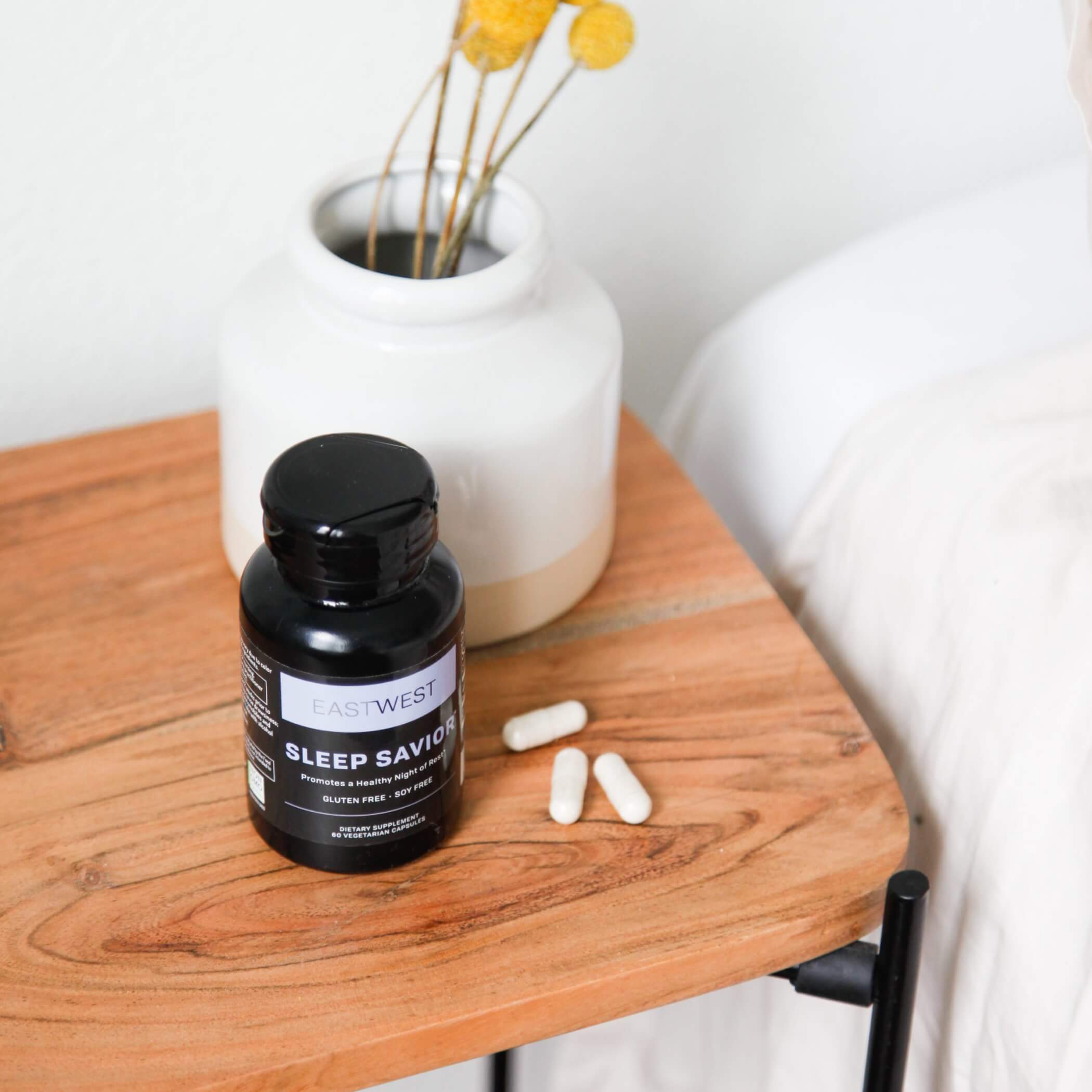Are you having trouble sleeping at night due to anxious feelings that seem to keep you awake? If so, it’s possible that your body is low on magnesium, a mineral essential to help the mind and body relax. Magnesium can be especially effective in helping you get better rest, reducing the anxiety and sleeplessness that come along with inadequate intake of this important nutrient. Let’s find out how magnesium for sleep can help improve your rest, and make it easier to fall asleep—even if you’re feeling particularly anxious.
Sleep is the foundation of overall health and well-being, but a struggle for many. And there’s no shortage of things that keep us up at night—stress, hormonal imbalances, distractions from the day, or just an overactive mind.
But fortunately there’s one mighty mineral that can help quiet the mind and get you a more restful night’s sleep.
If you’re struggling with hormonal imbalances and want a pathway forward, learn more about my holistic community, the Superwoman Circle. Membership is always open, and we’d love to support you!
What does magnesium have to do with sleep?
Magnesium is involved in more than 300 biochemical reactions in the body, many of which regulate sleep, mood, the nervous system, and important processes like circadian rhythm. Circadian rhythm is what controls energy during the day, and signals wind-down time at night. Magnesium has been shown to be fundamental in coordinating the daily sleep-wake cycle (1).

Adequate magnesium also stimulates gamma aminobutyric acid (GABA) activity, a neurotransmitter that acts like the brake pedal for an overactive brain (2). When GABA levels are low, the brain feels like it is constantly switched on, which makes it very difficult to relax and can lead to poor sleep and increased anxiety.
Other health benefits of magnesium include (3):
- Lowering blood pressure
- Relief from restless legs
- More restful sleep
- Improved blood sugar balance
We are a society that often has trouble relaxing, and nearly everyone has low magnesium intake. It’s for these reasons that nearly everyone can benefit from a magnesium supplement. It’s a well-known, easy, and safe way to achieve a calming effect and improve sleep.
Related: What to Do When Hormones Cause Brain Fog (& Other Mood Changes)
Many women are deficient in magnesium
Unfortunately, many people are likely experiencing the effects of magnesium deficiency. Magnesium is essential—our bodies don’t produce it—so we absolutely must get it through diet or with a magnesium supplement. For many reasons, including modern farming processes that strip the soil of minerals, and that many diets are low in magnesium-rich foods, most people aren’t getting enough magnesium.
Magnesium deficiency is also more common for women. After tracking magnesium levels in adults for a year, one researcher found that 75% of women consumed less than the RDA (300 mg/day) and only 1 out of 18 women had a truly optimal magnesium level (3).
Other things that contribute to a magnesium deficiency include poor absorption in the digestive system and inadequate mineral storage in bones. This makes maintaining healthy magnesium levels a lifelong battle for many women.
Read: The Link Between Hormones & Insulin Resistance
PCOS sufferers are more likely to be deficient in magnesium

Women who have PCOS are as much as 19 times more likely to be deficient in magnesium. Polycystic Ovarian Syndrome (PCOS) is a condition in which the ovaries produce excess androgens (male hormones), resulting in hormonal imbalance. Women with PCOS often experience a wide range of symptoms, including anxiety & difficulty sleeping.
Magnesium deficiency can exacerbate symptoms associated with PCOS and vice versa—magnesium helps to reduce the severity of many of these symptoms (4). Studies have shown that magnesium supplementation helps regulate hormones, reduce inflammation in the body, improve insulin sensitivity, and restore menstrual cycle (4,5).
Attention for PCOS: Are You Stuck in Fight-or-Flight Mode?
Without magnesium you’re likely to have more anxiety
The effects of a magnesium deficiency include worsening anxious feelings, which many people report are worst at night when trying to sleep.
Low magnesium levels may inhibit the body from producing serotonin, a hormone which helps regulate sleep, mood, and overall feelings of well-being. Low levels of serotonin can lead to feelings of anxiety, which is why supplementing magnesium is often recommended for those struggling with anxious thoughts. The majority of serotonin is made in your gut, which works efficiently with proper nutrition and adequate magnesium (6).
Plus, as mentioned above, magnesium helps to activate GABA and other calming neurotransmitters that put the brakes on an overactive mind.
Studies have shown that increasing magnesium intake can reduce anxiety symptoms and help improve both the quality and quantity of sleep (7).
Read: Adaptogens to Ease Stress, Anxiety, & Tension
How to get more magnesium
The good news is, there are plenty of ways to get enough magnesium for sleep and relaxation either through diet or with magnesium supplements.
At bedtime, consider magnesium + melatonin
To use magnesium for sleep, reach for a sleep supplement that contains magnesium and a modest amount of melatonin (3 mg or less). Melatonin is a hormone produced in the brain to regulate your sleep cycles and trigger relaxation. Together with magnesium, it makes a gentle but effective way to drift off with ease.
Most sleep supportive supplements contain a highly bioavailable form of magnesium, like an amino acid chelate. This helps soothe the mind and body to promote relaxation and sleep (8).
In one clinical trial, older adults who were experiencing insomnia found it easier to fall asleep when taking a nightly supplement containing magnesium, melatonin, and zinc (9).
During the day, look for a magnesium complex
A daytime magnesium supplement is helpful for many people to promote a relaxed state of mind. Complexes that contain multiple forms of magnesium are more versatile than single-form supplements and can help support the nervous system, mood, and energy production. Boosting your magnesium intake during the day can make the task a little less daunting when you finally lay your head down at night.
When choosing a magnesium supplement, look for a quality brand that is free from fillers, artificial flavors, and additives.
Eat magnesium-rich foods
Many nuts and seeds (especially pumpkin seeds) are high in magnesium. Leafy greens like spinach, Swiss chard, and kale are another great source. You can also get your daily dose of magnesium by eating bananas, avocados, black beans, dates, or figs.
Plus, if you needed an even greater reason to enjoy more dark chocolate, you’ll be happy to know it has a pretty good amount of magnesium. Depending on the type of chocolate, just one serving (about an ounce) contains anywhere from 40-60 mg of magnesium, which is roughly 20% of the RDA (10). If you’re using magnesium for sleep, don’t overdo it with dark chocolate, as it does contain a modest amount of caffeine as well.
Read: Eating This for Breakfast May Trigger Anxiety
Try an Epsom salt bath
Magnesium chloride, the main component of Epsom salt, is a form of magnesium that can be absorbed through the skin. Adding one to two cups of Epsom salt to your bath can help you relax and also supports cellular detoxification.

You can also find magnesium oil and lotion which allows magnesium to be absorbed through the skin. Many people use this to calm restless leg syndrome or provide relief for sore muscles.
Is it safe to use magnesium as a sleep aid?
Magnesium is a natural mineral that’s essential for your body to function. Magnesium supplements are considered very safe for the vast majority of people and there are few side effects. In higher amounts, some types of magnesium may cause loose stools. Sometimes, this is actually the desired effect, as some types of magnesium oxide have been used as a natural method to alleviate constipation by drawing water into the large intestine.
However, if you’re using magnesium for sleep, you’ll want to take a form that is more bioavailable and easier to absorb to minimize the likelihood of any GI upset.
Related: What to Do When Anxiety Gets Worse at Night
Using magnesium as a natural sleep aid when you have anxiety
Magnesium is the perfect choice for those who want to use a natural sleep aid. Not only can it promote relaxation and reduce anxiety, but it is also non-habit forming and free from many of the side effects associated with prescription medications. The best kinds of magnesium for sleep are:
- Magnesium bisglycinate or glycinate
- Magnesium amino acid chelate
- Epsom salt bath using magnesium chloride
When used properly, magnesium supplements are an effective way to manage stress and improve your sleep quality. Plus, they are relatively inexpensive and easy to find.
If you’re looking for a natural, safe way to reduce stress and improve your sleep quality, magnesium may be the answer. It is important to note that while magnesium can help promote relaxation and sleep, it is not a cure-all and should not be used in place of medical care. If you are struggling with mental health, it is best to seek help from a qualified professional or reach out for support from friends and family. Additionally, if you are experiencing symptoms of depression or anxiety that do not improve with supplementation, talk to your doctor as soon as possible.
Resources
- https://www.ncbi.nlm.nih.gov/pmc/articles/PMC4886825/
- https://www.ncbi.nlm.nih.gov/books/NBK507254/
- https://openheart.bmj.com/content/5/1/e000668
- https://www.ncbi.nlm.nih.gov/pmc/articles/PMC9027569/
- https://pubmed.ncbi.nlm.nih.gov/31960275/
- https://www.ncbi.nlm.nih.gov/books/NBK507250/
- https://time.com/6258780/magnesium-glycinate-sleep-anxiety-tiktok/
- https://www.ncbi.nlm.nih.gov/pmc/articles/PMC3703169/
- https://pubmed.ncbi.nlm.nih.gov/21226679/
- https://pubmed.ncbi.nlm.nih.gov/27346251/



